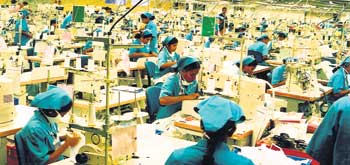
| Trade unions take JAAF court order to ILO The garment industry court order barring Port trade unions from taking trade union action, is to go before an international labour panel for a hearing. The International Labour Organisation’s (ILO) Committee on Freedom of Association has accepted a complaint from seven trade unions, claiming that worker’s rights are violated through the stay order.
Trade unions say the court order - taken out by the Joint Apparel Association Forum (JAAF) - violates international labour standards that Sri Lanka has agreed to uphold and is also inconsistent with Sri Lankan laws. Now the government has been asked by the ILO committee of experts to respond to the allegations. “Seven trade unions signed and presented the case to the ILO. They have accepted this case. They have also by now informed the government to respond,” said Saman Ratnapriya, President of the Health Services Trade Unions’ Alliance that is leading the trade union petition. The trade unions claim that the court order, prohibiting trade union action, affects Port workers’ right to collective bargaining. “The complainants state that as a result of this interim relief order it has now created a situation of forcing the members of the 14 Port unions, to offer their services/labour to the SLPA on terms and conditions which are against their will in order to ensure the economic/business stability of the JAAF,” says the trade unions petition to the ILO. Invalidate please “The government can make use of the courts in this way to deprive workers of their rights. For instance the collective agreement on Port workers’ salaries had to be renewed every three years but they didn’t do it. They started discussions in March 2006, for five months, but there was no result. Also the Minister of Ports never attended any of these talks and even made statements to the effect that he will not listen to trade union requests. That is when the Port trade unions started a ‘work to rule’,” said Ratnapriya. “So in future as well, the government can make use of the courts like this to control workers. Instead of discussing with workers and negotiating, the government can use the courts and a third party like JAAF, to clamp down on workers,” he said.So the trade unions are petitioning the ILO to declare the court order invalid – to discourage any future attempts at controlling trade unions in this fashion. JAAF response “It is not only the trade unions that we took to courts. We have even taken the Minister and the Ports Authority and everyone concerned. So we are not trying to suppress trade unions. We are just trying to survive,” said Chairman of JAAF, Ashroff Omar. The JAAF says it had no choice but to go to court over the industrial dispute as it severely affected the garment industry “We are already struggling to survive. The industry is facing huge problems. So if we could not even deliver the orders that we had undertaken, it would have killed the industry. Thousands of people would have lost their jobs. We had no choice. That is why we went to court and took everyone to court, including the Minister,” said Omar. “We vehemently reject any claims that the JAAF is trying to suppress trade unions and workers,” he said. Ripple effect on GSP+ “The GSP+ was given to Sri Lanka for good labour standards. So if it is found that these labour standards are not upheld, it could mean re-examining the validity of giving the GSP+ to Sri Lanka in the first place,” said Ratnapriya. The GSP+ is a special trade concession given by the European Union (EU). It allows Sri Lankan companies to export over 7,000 items, including garments, into the EU, duty free. Sri Lanka is the only country in South Asia to qualify for GSP+ and a main criterion is the exceptionally good domestic labour standards. Freedom of Association “These are procedures to try to find consensus. Not to penalise anybody. It is like a dispute resolution hearing. So both the government and the trade unions will be given a hearing,” said Ravi Samithadasa, Programme Assistant, ILO. The CFA is not a judicial body with legally binding powers. The power of the CFA comes from a country’s voluntary decision to comply with ILO standards. Sri Lanka has accepted and ratified Convention No. 87 on Freedom of Association and Convention 98 on Collective Bargaining. So Sri Lanka is expected to stick to its commitments. But these commitments are not simply additional burdens. They translate into other spin-off benefits for developing countries like Sri Lanka. For instance the EU’s GSP+ that allow Sri Lanka to export into the EU duty free, was awarded because of the country’s high labour standards. This is not the first time the government of Sri Lanka has been reported to the ILO. In 2001 the ILO found against the government on an ‘essential services’ order that prohibited strikes or similar industrial/trade union action in workplaces that were declared as essential. The government amended its ‘essential services’ order after the ILO ruling. |
| || Front
Page | News
| Editorial
| Columns
| Sports
| Plus
| Financial
Times | International
| Mirror
| TV
Times | Funday
Times | MediScene || |
| |
Copyright
2006 Wijeya
Newspapers Ltd.Colombo. Sri Lanka. |
